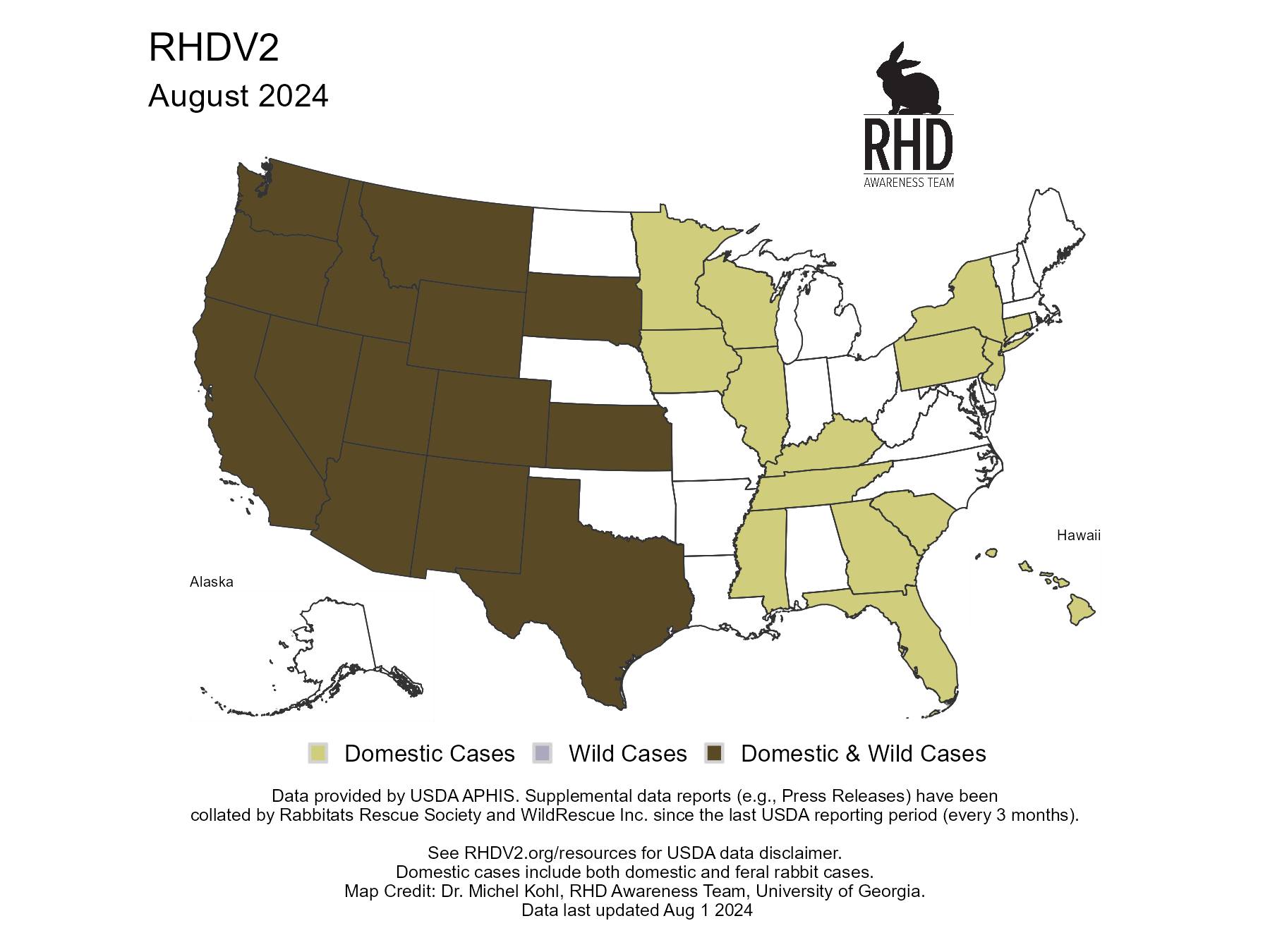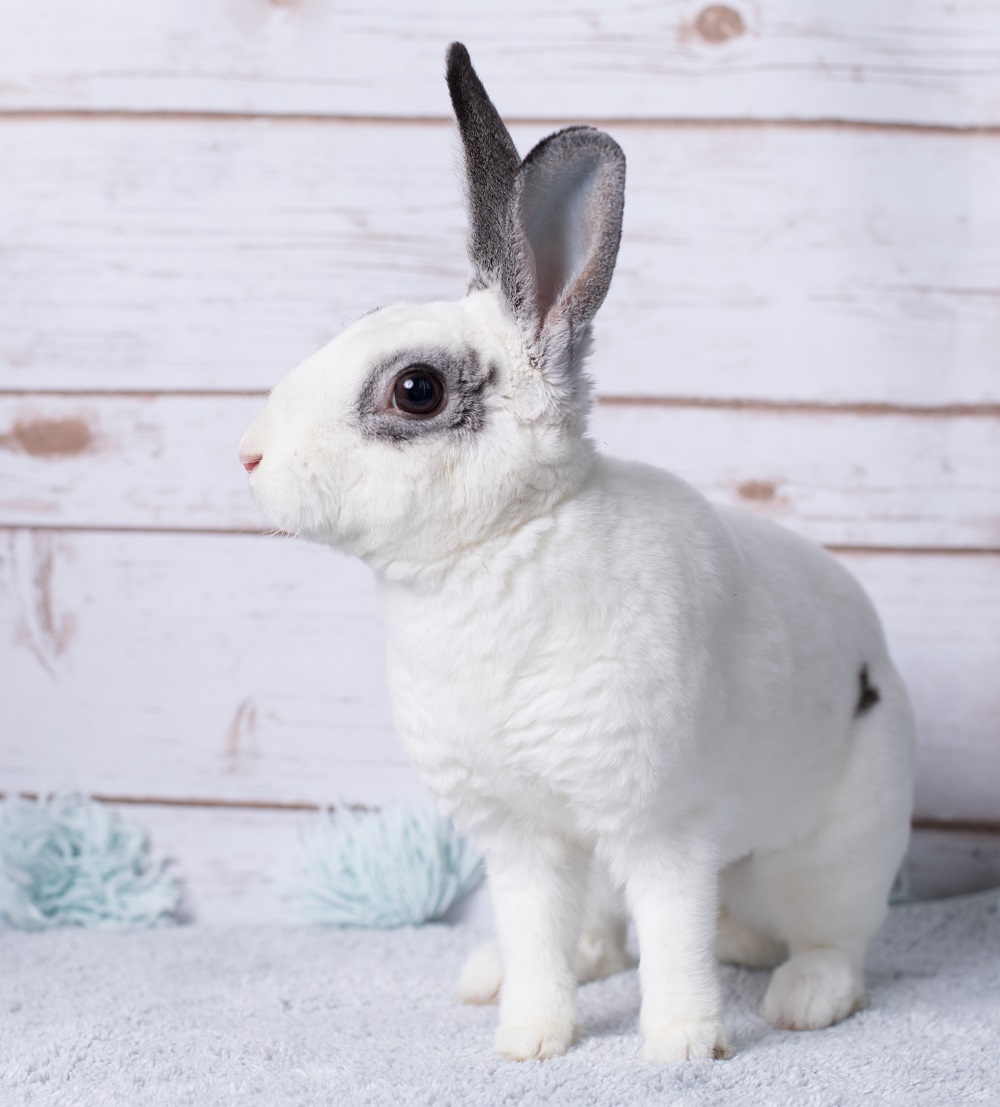Rabbit Hemorrhagic Disease Virus 2
RHDV2 is a highly contagious and deadly rabbit disease that infects wild and domestic rabbits, hares, and related species, spreading across the U.S. It cannot be transmitted to people or other domestic animals. The mortality rate for the RHDV2 variant in the U.S. is approximately 90%. There is no treatment for RHDV2. Fortunately, there are steps rabbit caretakers can take to prevent its transmission.
The best way to protect your rabbits from RHDV2 is through a combination of yearly vaccination, indoor housing, and biosecurity measures.** Of these, the most effective protection is the vaccination. Here's a handout you can print and share with other rabbit caretakers. rhdv.pdf
Here is a map showing RHDV2 cases in the U.S. as of August 2024:

Scroll to the bottom of the page for a list of veterinarians in the Los Angeles area who have ordered vaccine. Please note that RHDV2 vaccinations are ANNUAL. If you adopted from us, the vaccinations are a requirement per your adoption contract.
Here are some things you can do to help protect your rabbits from the virus:
- Keep your rabbits indoors 100% of the time. If your rabbits are not indoors now, it's time to consider moving them inside.
- Do not wear your outside shoes in the home. Practice keeping shoes outside if you don't normally do this, and set aside "indoor" footwear.
- Avoid contact with rabbits or hares outside the home. Plan what to do if you volunteer at an animal shelter, or have friends with rabbits you watch or visit. Minimize the risk of spreading the virus on your clothing, shoes, and surfaces, using shoe covers and disinfecting with recommended products only in recommended concentrations. Effective disinfectants include: bleach (1:10 dilution), potassium peroxymonosulfate (Virkon), accelerated hydrogen peroxide (Prevail, Accel, and Peroxigard). Do not use these on or around your rabbits.
- Keep mosquitoes and flies out of the home with window and door screens.
- Keep dogs and other pets that go outdoors separate from your rabbits. Plan what to do if you have other pets that go outside, and consider flea control for them if you don't have it already. If your dog goes on hikes, be careful to wash paws with soapy water and not allow your pup to go into the same areas as your rabbit.
- Do not feed greens that you have foraged (dandelions from the yard, for example). Look for commercial greens sources in areas that haven't had confirmed RHDV2 cases. Leafy greens that are grown in a greenhouse are probably safe. There is no way to truly "sterilize" leafy greens. It does make sense to rinse vegetables thoroughly to reduce general contaminants and dirt that could have virus sticking to them. Consider growing leafy greens in indoor hydroponic or aerogardens.
- Feed hay that has been harvested at least 105 days prior. If you buy relatively fresh hay from a hay barn, find out where that hay was harvested and avoid hay from outbreak areas. Hay should be stored indoors only away from rodents or insects. You'll want to store it in cardboard boxes or other breathable container, or the hay could mold. Pre-packaged hay at least 3 months past harvest is likely safe.
- Keep in mind that adherence to all the biosecurity measures above is no guarantee your rabbit will not be exposed to the virus. That is why most exotic veterinarians recommend vaccination.

If you see a deceased rabbit whose cause of death is unknown, do NOT touch the rabbit.
- For domestic rabbits, contact California Department of Food and Agriculture at: 909-947-4462.
- For wild rabbits, contact California Department of Fish and Wildlife at: 916-358-2790.
Veterinarians in the Greater Los Angeles Area Vaccinating for RHDV2
Contact your primary veterinarian first to see if s/he is carrying the vaccine.
Please be patient and polite with veterinary staff!
Note: In October 2021, a safe and effective U.S.-based RHDV2 vaccine was released by Medgene Labs. Learn more about the Medgene vaccine: medgenelabs.com/rhdv2. The new Medgene vaccine requires two doses, 21 days apart. ONE INITIAL DOSE DOES NOT PROVIDE IMMUNITY. For the second year, a single booster shot should be adequate.
Pop-up Clinics:
None currently
Ongoing:
Laguna Vista Veterinary Center
26333 Vermont Ave.
Harbor City, CA 90710
310-737-8600 (call or text)
Amazing Small Animal Practice
14800 S Western Ave.
Gardena, CA 90249
(310) 908-0510
www.lowcostpetvaccines.com
Various locations; see website. Bring rabbits in hard carrier for safety. Dogs and cats will also be at these clinics.
818-478-2403 Microchip required.
Avian and Exotic Animal Hospital
4871 W Rosecrans
Hawthorne, CA 90250
310-679-0693
VCA Arden Animal Hospital
407 Arden Ave.
Glendale, CA 91203
818-246-2478
Point Vicente Animal Hospital
31270 Palos Verdes Drive W.
Rancho Palos Verdes, CA 90275
310-265-9500
Northwood Animal Hospital
13925 Yale Ave.
Irvine, CA 92620-2669
949-559-1992
Westminster Veterinary Group
6621 Westminster Blvd.
Westminster, CA 92683
714-899-1100
VCA West Los Angeles
1900 S. Sepulveda
Los Angeles, CA 90025
310-473-2951
Exotic Animal Veterinary Center
171 N. Altadena Dr., Suite 120
Pasadena, CA 91107
626-405-1777
ACCESS Specialty Animal Hospitals
9599 Jefferson
Culver City, CA 90232
310-558-6100
Animal Medical Center
91 E Grand Blvd #102
Corona, CA 92879
951-493-6771
Baker Bristol Pet Hospital
2976 Bristol St.
Costa Mesa, CA 92626
714-546-0010
East Ventura Animal Hospital
10225 Telephone Rd., Unit D
Ventura, CA 93004
(805) 647-8430
Capri Plaza Pet Clinic
19582 Ventura Blvd.
Tarzana, CA 91356
818-881-6344
Cinema Veterinary Centre
23460 Cinema Drive
Valencia, CA 91355
661-253-9300
VCA Wilshire
2421 Wilshire Blvd.
Santa Monica, CA 90403
310-828-4587
Pet Wellness Center
23644 Clinton Keith Rd.
Murrieta, CA 92562
951-473-2227
Chaparral Pet Hospital
915 W Foothill Blvd., Ste A
Claremont, CA 91711
909-625-1561


